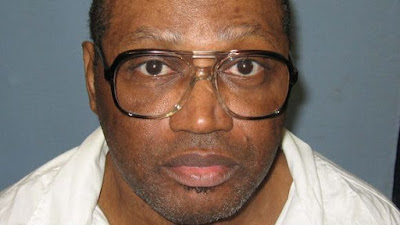 |
The inmate suffered two strokes that left him with memory loss and made it
difficult for him to communicate. He is “legally blind, cannot walk independently,
is incontinent and has slurred speech. Not enough to stop his execution, the 11th
Circuit Court of Appeals Court ruled. |
A panel of federal judges Wednesday ruled that a series of strokes rendered an Alabama death row inmate incompetent and prevented his execution.
The three-judge panel of the U.S. 11th Circuit Court of Appeals ruled that an Alabama court improperly found that Vernon Madison, condemned for the 1985 murder of Mobile police officer Julius Schulte, could rationally understand that he faced execution after a series of strokes.
Writing for the majority, U.S. Circuit Judge Beverly Martin wrote that the lower court misinterpreted a statement from court-appointed psychologist Dr. Karl Kirkland about Madison’s ability to comprehend his sentence.
“The only evidence in the record that does address this issue demonstrates that, due to his serious mental disorder, Mr. Madison does not understand the connection between his crime and his execution,” Martin wrote in an opinion joined by U.S. Circuit Judge Charles Wilson.
The U.S. Supreme Court ruled in Ford v. Wainwright in 1986 that executing a person who cannot understand the reason for his or her execution violates the Eighth Amendment to the U.S. Constitution's ban on cruel and unusual punishment. The panel stayed Madison’s execution last May,
just hours before the inmate was scheduled to die.
The Alabama Attorney General’s Office had no comment on the decision Wednesday. A request for comment was left Wednesday with the Montgomery-based Equal Justice Initiative, which represented Madison.
Madison stood trial three times for the murder of Schulte. Madison shot Schulte in the head on April 18, 1985, while Schulte responded to a report of missing child at a home where Madison was staying. Madison also shot his then-girlfriend, though she survived the attack.
The Alabama Court of Criminal Appeals overturned Madison’s first conviction because prosecutors excluded blacks for the jury pool. A second conviction was set aside because prosecutors elicited expert testimony “based on facts not in evidence.” A third trial in 1994 led to Madison’s conviction. The jury in that trial sentenced Madison to life in prison after hearing evidence of mental illness. Mobile County Circuit Judge Ferrill McRae overrode the jury’s decision and imposed a death sentence.
The inmate suffered two strokes – one in May 2015 and one in January 2016 – that left him with memory loss and made it difficult for him to communicate, according to the court. Madison, according to the court, is “legally blind, cannot walk independently, is incontinent and has slurred speech.”
Before a competency hearing, Kirkland, the court-appointed psychologist, evaluated Madison, as did Dr. John Goff, retained by Madison’s legal team.
Both said Madison suffered significant damage from the strokes. Kirkland, though, said that Madison “appears to be able to have a rational understanding of the sentence.” Goff said Madison could not remember the crime or the victim.
In court testimony, Kirkland said Madison could talk “about very specific things that would indicate that he could remember specific things about the time of the offense.” Goff said he only knew of that from conversations with his attorneys.
The court accepted Kirkland’s testimony and said Madison had not proven his incompetence.
Martin wrote that Kirkland’s testimony was “insufficient” to support the court’s ruling, writing the state never rebutted Goff’s testimony that Madison could not remember killing Schulte, and that unlike Goff, Kirkland did not evaluate whether Madison understood that his crime was the reason for his execution.
“The conclusions in Dr. Kirkland’s report appear to rely exclusively on Mr. Madison’s ability to discuss the history of his case,” the majority wrote.
In a dissent, U.S. Circuit Judge Adalberto Jordan wrote that he believed Madison was incompetent, but said the federal court lacked authority to give Madison relief.
“I acknowledge that Dr. Kirkland may not have performed the most exhaustive of examinations, may not have asked the best questions, and may not have provided the most pristine opinion,” Jordan wrote. “But that is not dispositive because Alabama did not have the burden of proof.”
Source:
Montgomery Advertiser, Brian Lyman, March 15, 2017
⚑ | Report an error, an omission, a typo; suggest a story or a new angle to an existing story; submit a piece, a comment; recommend a resource; contact the webmaster, contact us:
deathpenaltynews@gmail.com.
Opposed to Capital Punishment? Help us keep this blog up and running! DONATE!












